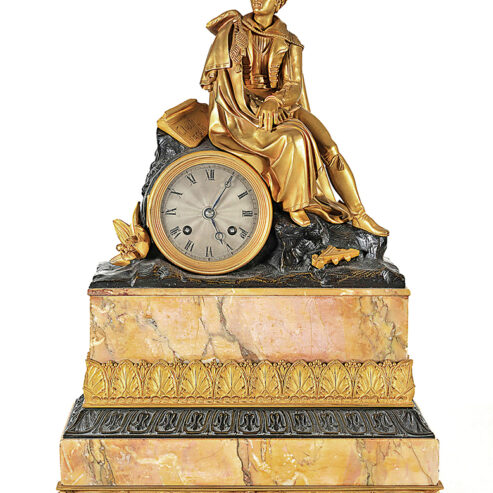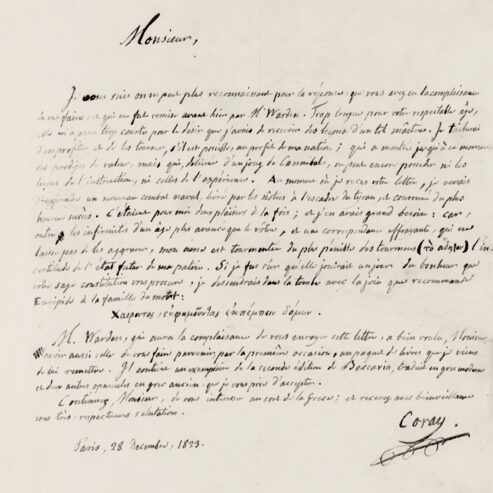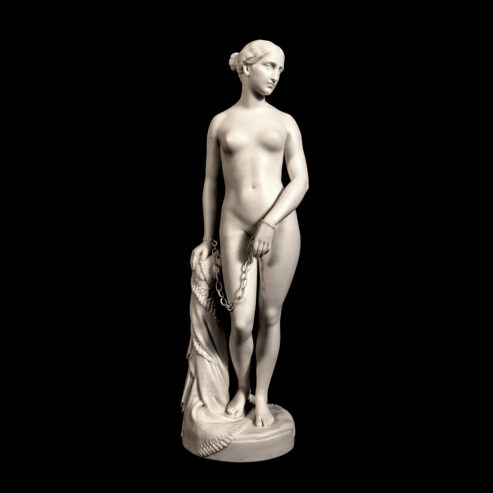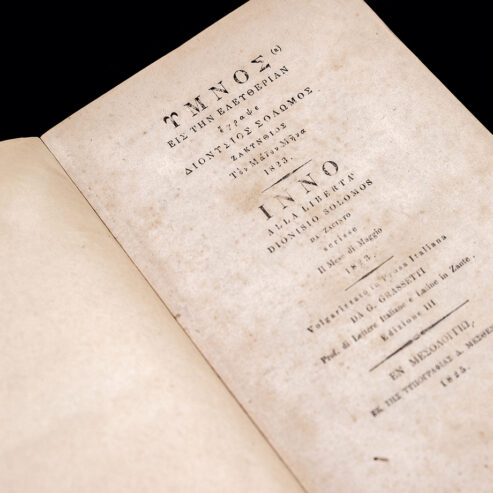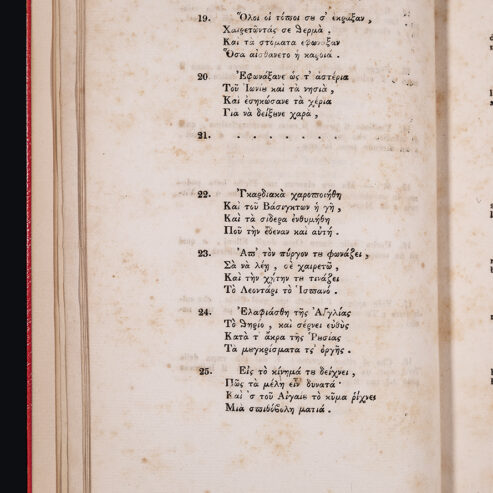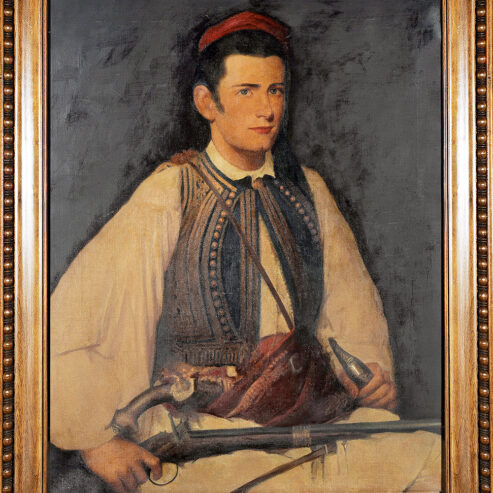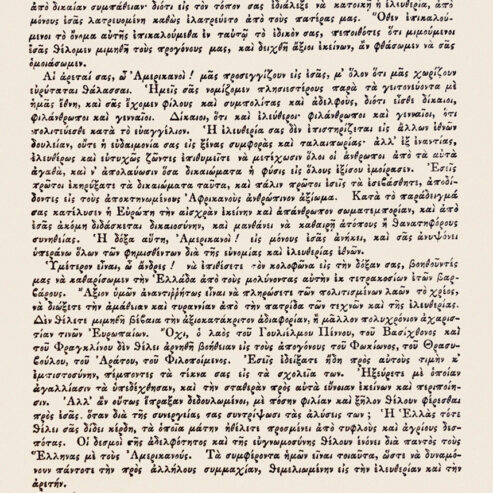A new exhibition at the American School of Classical Studies at Athens explores the relations and connections between Greece and the United States during the century of revolutions.
To mark the 200th anniversary of the Greek Revolution, a theme dominant among the significant collections of the Gennadius Library, the American School of Classical Studies at Athens is organizing an exhibition on American Philhellenism to be held from May 25 to December 19, 2021. Part of an important American institution that has distinguished itself in the study of Greece since 1881, the Gennadius Library focuses on the history of Greece, sο the bicentenary is a unique opportunity to explore the relations and connections between Greece and the United States during the century of revolutions. The exhibition, which will also be available online, is based on rare archival material from the Gennadeion, as well as paintings and relics of museums and private collections in Greece.
The ancient Greek ideals of freedom and democracy created strong bonds between America and the Greek revolutionaries, which are also reflected in the Hymn to Liberty – the national anthem of Greece – of Dionysios Solomos.
Heartily with joy salutes thee
That free land of Washington,
Mindful of the bonds that fettered
Her own limbs, not long agone.
(transl. Florence McPherson, 1884)
The Gennadius Library contains rare publications, pamphlets, memoirs, newspapers, archival material, engravings, travelogues, maps, poems, and textbooks that are well-known resources for the history of the Greek Revolution and Philhellenism. The exhibition is also enriched with loans from: the Society of Hellenism and Philhellenism, the Collection of Michael and Dimitra Varkarakis, the Archives of the Hill School, the Archives of the British School of Athens, the National Historical Museum, the Museum of History of the University of Athens, the Diplomatic and Historical Archives of the Ministry of Foreign Affairs and Mr. Konstantinos Arniakos.
Moved by the Greek uprising against Ottoman rule, the American Philhellenes sparked public sentiment and sympathy for Greece, raised money and supplies to help the struggle, and pressured their political representatives to recognize Greek independence. Focusing on the action of individual actors, educators, orators, politicians, and fighters, the exhibition highlights the multi-layered American support for the cause of the Greeks and the impact that the movement of Philhellenism had on the development of the new Greek state.
Founded in 1922 to house the library of the Greek ambassador Joannes Gennadius, the Gennadius Library holds unique treasures on the Greek War of Independence and Philhellenism including memorabilia of the consummate philhellene, Lord Byron. His poetry and the atrocities committed by the Ottomans against the Greeks, communicated swiftly to America in the press, motivated American Philhellenes to join the revolutionaries, to collect money and supplies for humanitarian aid to Greece, and even to adopt orphaned Greek children.
The Enlightenment had prepared the ground: As the birthplace of western civilization embracing Christianity, Greece deserved to be resurrected as a free and democratic state. Once freed, Greece built its educational infrastructure with the succor of American missionaries who set up successful schools on Greek soil.
Finally, the plight of Greek slaves fueled abolitionist discourse in the US, as the story of Hiram Powers’s sculpture The Greek Slave amply demonstrates. To capture the complex range of interactions between the two countries, the exhibition extends from the American Revolution of 1776 to the Cretan revolt of 1866.
Greek intellectual Adamantios Korais exchanged views on the Greek Revolution and the Constitution with the Founding Father of the American Nation, Thomas Jefferson. In May 1821, Petrobeis Mavromihalis appealed on behalf of the Greek revolutionaries for recognition and support from America to the young Professor Edward Everett, the first holder of the Greek Elliot Chair at Harvard.
The New Yorker George Jarvis became a lieutenant general in the Greek forces, known as “Captain Zervos,” while the young doctor Samuel Gridley Howe came to Greece after graduating from Harvard in 1824 and served as chief surgeon of the Greek army. Committees of American Philhellenes in New York, Philadelphia and Boston sent significant humanitarian aid to Greece and rescued orphaned Greek children in the USA.
The educational activities of Protestant missionaries in Greece provided Greek schools with precious textbooks translated from the English, while the successful school founded by Reverend John J. Hill and his wife Frances in Athens continues to operate to this day (Hill Memorial School).
The exhibition also explores the role played by the slave trade, as experienced by the American Philhellenes in the slave markets of the East, on the discourse about the emancipation of slaves in the United States. The slave markets of Constantinople, and especially the ordeals suffered by Greek women in bondage, were captured with great artistry by the American sculptor Hiram Power in a famous marble sculpture, The Greek Slave. The important aesthetic impact of this statue on the American public fueled heated discussions about slavery in antebellum America.
The exhibition is sponsored by the U.S. Embassy in Greece, as part of its programs to celebrate the 200th anniversary of the Greek Revolution entitled “USA & Greece: Celebrating 200 Years of Friendship.”
VISIT THE EXHIBITION
The Free and the Brave. American Philhellenes and the “Glorious Struggle of the Greeks” (1776-1866)
WHEN: May 25 to December 19, 2021
WHERE: On location at Gennadius Library, I. Makriyannis Wing,
at The American School of Classical Studies at Athens, Souidias 54
Online at www.ascsa.edu.gr
The exhibition is curated by Dr. Maria Georgopoulou
With thanks to the American School of Classical Studies at Athens. Business Partners
also thanks Artemis Zenetou and Fulbright Greece for their help in arranging this feature.


